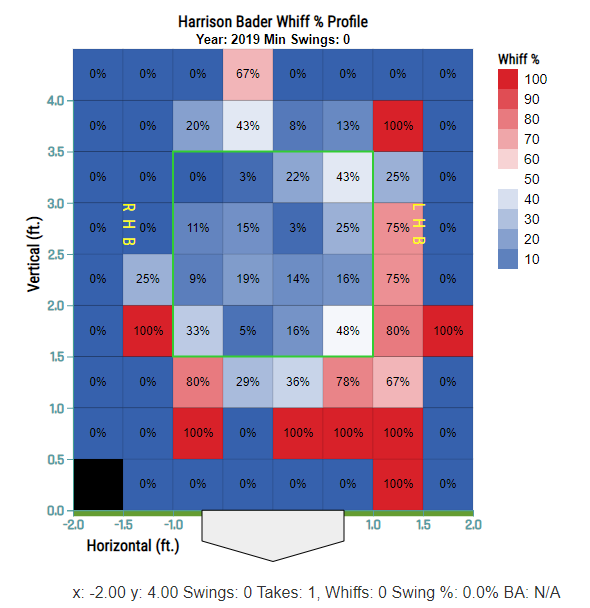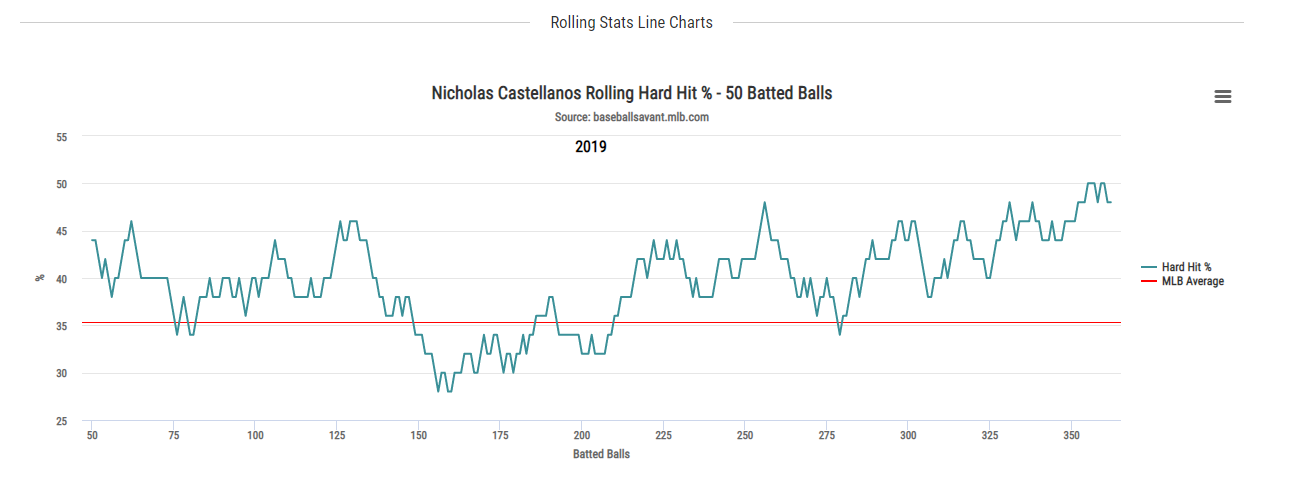Harrison Bader (OF, St. Louis Cardinals) is not having a great season. Despite last night’s strong performance (1-1, 2 R, 3B, RBI, 3 BB—more on this later), he’s slashing just .198/.319/.351 on the season and in late July was demoted back to Triple-A to work on his swing and approach at the plate.
While Bader is an excellent defender in center field, his .215 expected batting average indicated that he simply wasn’t making enough good contact to keep around in a somewhat crowded Cardinals outfield. In particular, he was really struggling with pitches low and away, as shown in his whiff-rate profile below (courtesy of Statcast):

For young players, being demoted can be an opportunity, particularly for young players on teams that are in contention and can’t afford to let a young player work things out in the big leagues. According to Jenifer Langosch of MLB.com, Bader worked with Cardinals hitting coach Jobel Jimenez to reset his swing and mindset in the box, which appears to have paid dividends in Memphis as he had hits in 13 of 16 games with a .317/.427/.698 line.
Swing changes are often a cause for fantasy excitement as they give new hope to a player who has likely been disappointing us for a while (after all, hitters don’t mess with their swings unless something isn’t going well). While Bader will likely need to do more than just change his swing to succeed against major league pitching, we’ve seen a few other positive signs from Bader despite the poor hitting performance, such as a 12.1% walk rate (up from 7.3% in 2018), a slight reduction in strikeout and swinging-strike rates, and a drop in his O-Swing rate. If he can maintain those gains in addition to improved quality of contact, Bader might be able to unlock some of the power/speed potential that made him appealing last season.
At this stage of the game, people fighting for roto points or a head-to-head playoff spot have to be willing to take risks to get what they need. While there is some playing time uncertainty for Bader (he’ll have to share the outfield with Marcell Ozuna, Tommy Edman, Dexter Fowler and to some extent the surprising Lane Thomas for playing time in the short term), there’s also a chance that Bader starts 30 games the rest of the way and swipes three to five bases with a handful of home runs. If you’re in a 12-team or deeper league with five required outfielders, Bader could be a guy who helps you make up some ground or maintain an edge in stolen bases while also contributing to other categories.
Nick Castellanos (OF, Chicago Cubs)—3-5, R, HR, RBI. Yeah, he’s hitting home runs in bunches as a Cub, and his .460 wOBA in August is 14th of 193 qualified hitters for the month. I’ll take the early L on saying he wouldn’t be much better as a Cub, though the below chart of his rolling hard hit rate per 50 batted balls suggests that his performance spike is not so much the ballpark helping him as it is just the fact he’s hitting the ball harder.

Nelson Cruz (DH, Minnesota Twins)—4-5, 3 R, HR, 3 2B, 3 RBI. I’ll be drafting him next year, probably within the first 75 picks. He’s old and is only eligible at DH, but he continues to do amazing things with his bat. He’s on pace to hit 40 home runs and tally 100 RBI in, like, 120 games (which is just the second time in eight seasons that he’ll play fewer than 140 games and the third time he’ll play fewer than 152). Old man Cruz is having one of the best seasons of his career at age 39 and that’s incredible.
Trevor Story (SS, Colorado Rockies)—4-4, R, 2B, 3 RBI. A second consecutive season of a manageable strikeout rate and a batting average above .290 should solidify him as perhaps the premier fantasy shortstop—an incredible feat considering the depth of the position.
Jose Altuve (2B, Houston Astros)—3-5, 2 R, HR, 2 RBI. His 187 wRC+ in the second half is tied for fifth in baseball with a couple of guys named Mike Trout, Yordan Alvarez, and Alex Bregman. The stolen bases have come up slightly, though he looks like he might fall short of 10 for the season. He’s still a top-10 second baseman in 2020 for me, but he’ll be a love/hate kind of player for many.
Freddie Freeman (1B, Atlanta Braves)—3-4, 3 R, 2 HR, 4 RBI. He’s been fantasy baseball’s second-best first baseman this season behind only Cody Bellinger per ESPN’s Player Rater, and he’s a safe, consistent, and strong pick in the late first or early second rounds of fantasy drafts next season. His next home run will tie his career high of 34 set in 2016, and he’s likely to push for 40 by the time the regular season wraps up.
Anthony Rizzo (1B, Chicago Cubs)—3-3, 3 R, 2 HR, 2 RBI, BB. He might be one of the most consistent first base assets in fantasy. You can basically pencil in about 30 home runs, a .280 batting average, 100 RBI (a figure he’s likely to meet for the fifth straight season), and an OBP of at least .385. What’s not to like?
Chris Taylor (2B/SS/OF, Los Angeles Dodgers)—3-4, 3 R, HR, 4 RBI, BB. He’s back in action for the Dodgers and get semi-regular playing time as a utility piece, but his fantasy value is probably limited to deep daily leagues where you can take him out of the lineup when he doesn’t play. He’ll probably see consistent time against lefties, as teammates Joc Pederson and Matt Beaty hit the bench, but how much time he’ll see against righties remains to be seen.
Bo Bichette (SS, Toronto Blue Jays)—2-4, 2 R, 2 HR, 2 RBI. In his first 98 major league plate appearances, Bichette has shown power, speed, and contact ability with decent plate discipline. He’ll have to get smarter about base stealing, as he’s been caught four times in six attempts, but you can’t ask much else from the young Blue Jay. Oh, and this wasn’t against some random pitcher—Bo hit those knocks off of Clayton Kershaw.
Matt Olson (1B, Oakland Athletics)—2-3, 2 R, HR, 2 RBI, BB. He’s going to best the 29-home run mark he had in 2018, which is particularly impressive considering that he’s going to do it in about 40 fewer games. If he can play 150 games next season, I think he’ll cruise into the 40-home run club.
A. J. Pollock (OF, Los Angeles Dodgers)—2-4, 2 R, HR, 2B, RBI, 2 BB. The power isn’t overly impressive and he probably won’t steal 10 bases in a full season, but he provides decent batting average and counting stats as the Dodgers’ leadoff hitter. He’s kind of like a poor man’s Michael Brantley at this point.
Kyle Seager (3B, Seattle Mariners)—2-3, 2 R, HR, 2B, 3 RBI, 2 BB. He now has a hit in 24 of his past 25 games with an insane 1.220 OPS in that stretch. He’s available in 70% of ESPN leagues, which seems WAY too high for the kind of numbers he’s putting up right now.
Max Kepler (OF, Minnesota Twins)—2-5, 3 R, HR, 2B, 3 RBI. He’ll flirt with 40 bombs on the season, but the real story will be his incredible improvements against southpaws. He has a .290 batting average against them this year and a .869 OPS, both of which are dramatic improvements over his career totals. Single-season platoon splits are really difficult to rely on, but such a dramatic improvement is impossible to ignore.
Yordan Alvarez (OF, Houston Astros)—0-0, 4 BB. I found this humorous. Interesting strategy, Tigers. Very interesting.
Khris Davis (DH, Oakland Athletics)—0-4, 4 K. It’s been an incredibly disappointing season by all accounts. He’s not hit going to hit .247 (currently hitting .220), he’s not going to hit more than 25 home runs, and he probably won’t get more than 60 runs or 75 RBI. The 2019 version of Khris Davis is not rosterable in most formats.
And finally, a few hand-picked stat lines from yesterday’s minor league action, courtesy of Shelly Verougstraete:
Interesting #MiLB stats from yesterday
Dylan Carlson (STL AAA) 3-4, 1 2B, 1HR, 2RBI
Andres Gimenez (NYM AA) 3-5, 1HR, 1SB, 2RBI 🍟Jesus Luzardo (OAK AAA) 4.2IP, 5K, 2BB, 1ER
Nick Neidert (MIA AAA) 6IP, 10K, 0BB, 0ER 🔥— Shelly 'First Rate' Verougstraete (@ShellyV_643) August 21, 2019
(Photo by Andy Lewis/Icon Sportswire)

Minor correction: BOTH Bo Bichette bombs bruised Kershaw, not just the first.
Minor but important (and impressive)! I’ll make the update.